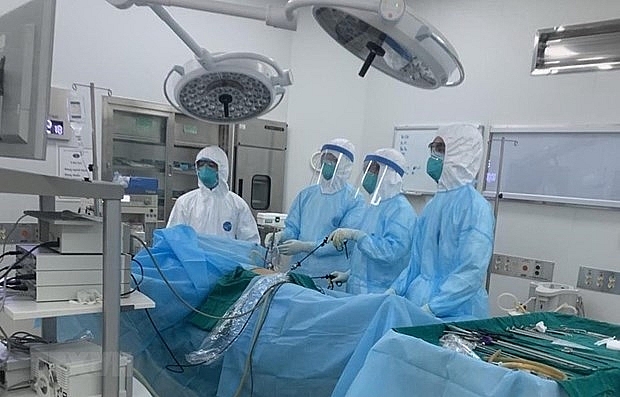Rising inequality threatens to deny access to basic healthcare for some
 |
| Vietnam's healthcare remains too costly for some. Photo: VNA |
Harsh life for patients
P.T.T. is a 55-year-old patient in Hanoi. She usually goes to the hospital for kidney dialysis three times a week. She has no health insurance to share the cost of her dialysis and daily medication and has never thought about a kidney transplant.
“I feel sad for myself when I see the prescriptions I cannot afford. People who can afford medicine are often healthier. I feel that my life is too difficult and I am stuck,” said P.T.T.
One year ago, she used to clean in restaurants and schools and could earn $217-300 monthly for working day and night, barely enough to pay for rent, groceries, and treatment. However, the pandemic, along with social distancing, have taken all her income away. Restaurants and schools closed for many months, while she still had to go to the hospital three times a week for dialysis.
“When people are sick, some start selling their farmland and assets, even borrowing a lot of money to cover the cost of the treatment. If the government was to provide more support, I would have fewer burdens, and my life wouldn’t be as hard,” she said.
Vietnam’s economy has grown rapidly in recent years, but people like P.T.T. are yet to fully profit from this. According to Oxfam in Vietnam, more than 10 million people are living in poverty, often women, people in rural areas, and ethnic minorities.
"Pregnant women from poor households are three times more likely to go without antenatal care. A quarter of the population lacks health insurance and even those that are insured still have to pay extra in order to get the care they need. Worse still, a total of around three million people in Vietnam are pushed into poverty each year due to medical costs," said Nguyen Tue Anh, visiting postdoctoral fellow Center for International Development at Havard University.
The high costs of COVID-19 vaccines were also causing a lot of troubles in 2021 when the overall coverage remained behind other countries. In the last months of 2021, numerous people in far-reaching areas still could not be inoculated, while others living in large cities were receiving their second dose.
According to the Ministry of Health, the ratio of people who have to pay for medical services by themselves without any assistance from the government and insurance sits around 43 per cent.
These high costs of vaccines and medicines have caused millions of poor people in the far-reaching areas of Vietnam, as well as other developing countries, to be unable to pay for treatments.
Holistic social protection policies required
Inequality in living standards in Vietnam has increased over the years. Vietnam's GINI coefficient in 1993 was 0.33, but in 2016 it increased to 0.44. In 1993, the richest 20 per cent had an income that was 4.4 times higher than the poorest 20 per cent. By 2016, that income gap was already 10-fold higher, according to Oxfam in Vietnam.
Among the 10 million poor people in Vietnam, most of whom are ethnic minorities living in remote areas, most have limited access to basic public services, and if of low quality. Meanwhile, the absolute increase in households' out-of-pocket health spending continues to challenge the share of the population without health insurance.
“Health insurance cardholders still have to pay unforeseen and burdensome out-of-pocket amounts such as the costs of using equipment purchased from a socialised source, drugs not covered by insurance, and costs of transporting patients, meals, and accommodation for family members taking care of patients,” said Phung Duc Tung, director of the Mekong Development Research Institute.
“They need stronger and specific social protection policies, which can cover their basic needs at a standard that is higher than the current poverty line. This is either because they cannot participate in the country’s development process, or benefit from macroeconomic growth because they do not have the opportunities nor the capability to seize them,” added Tung.
Le Thi Cam Thanh, vice director of the Eye Hospital of Can Tho province, argued “It only takes a small amount to save so many lives. If the wealthier pay their taxes, it doesn’t just benefit the poor people, it helps the families and the economy. For example, if a poor child with an eye problem gets the healthcare they need, he or she can continue going to school, learn more, get a higher education and a better future.”
What the stars mean:
★ Poor ★ ★ Promising ★★★ Good ★★★★ Very good ★★★★★ Exceptional
Related Contents
Latest News
More News
- Tet event in Japan celebrates success of 14th National Party Congress (January 25, 2026 | 10:04)
- 14th National Party Congress wraps up with success (January 25, 2026 | 09:49)
- Congratulations from VFF Central Committee's int’l partners to 14th National Party Congress (January 25, 2026 | 09:46)
- List of newly-elected members of 14th Political Bureau announced (January 23, 2026 | 16:27)
- 14th Party Central Committee unanimously elects To Lam as General Secretary (January 23, 2026 | 16:22)
- List of members of 14th Party Central Committee announced (January 23, 2026 | 09:12)
- Highlights of fourth working day of 14th National Party Congress (January 23, 2026 | 09:06)
- Press provides timely, accurate coverage of 14th National Party Congress (January 22, 2026 | 09:49)
- Press release on second working day of 14th National Party Congress (January 22, 2026 | 09:19)
- Minister sets out key directions to promote intrinsic strength of Vietnamese culture (January 22, 2026 | 09:16)

 Tag:
Tag:


























 Mobile Version
Mobile Version